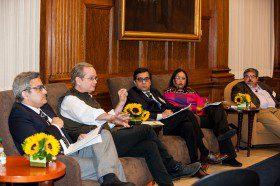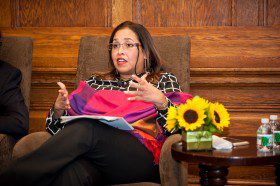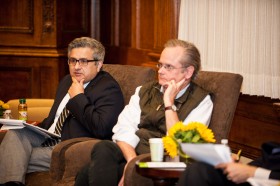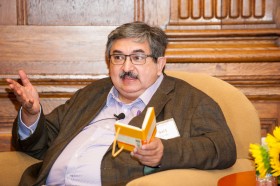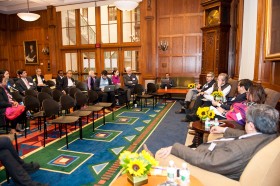This is the second in a series of three recaps of SAI’s Symposium, which took place on May 5 and 6, 2016.
By Mircea Raianu, PhD Candidate, History Department; SAI Graduate Student Associate
On the morning of May 6, South Asia Institute’s Annual Symposium, “Who Speaks for Democracy Across South Asia?” featured a panel facilitated by Ashutosh Varshney, Sol Goldman Professor of International Studies and the Social Sciences, Brown University, which focused on the distinction between electoral and liberal democracy in South Asia and beyond. The panel addressed these questions and more: To what extent, and why, has the provision of liberal freedoms (of expression, religious practice, and association) lagged behind the electoral aspects of democratic functioning? And what might the future of both aspects of democracy look like?
In his introductory remarks, Varshney explained that the theory and practice of democracy converge on two aspects: electoral and non-electoral (concerning the protection and preservation of basic freedoms between elections). To evaluate both aspects, South Asian countries must be considered in a regional as well as international perspective. India’s democracy, Varshney argued, can best be described as a combination of electoral vibrancy and liberal deficits. Since 1989, the poorer and less educated have voted as much as (if not more) than the richer – a phenomenon in complete defiance of existing democratic theory linking electoral participation with social and economic development. The biggest weakness of the electoral process remains finance. Yet, businesses are unable to determine election outcomes; often the poorer party wins. In this respect, India may be seen as the “poor exception” and Singapore, an authoritarian but developmental regime, the “rich exception” to democratic theory.
At the same time, liberal freedoms of expression, association, and religion are not robustly anchored. India is at its freest during the time of elections, while governments in power (whether Congress or BJP) tend to place restrictions on basic freedoms whenever any group claims to be hurt. For example, the ban of Salman Rushdie’s novel The Satanic Verses for fear of offending Muslim sentiments, and artist M.F. Hussain’s exile from India in the face of Hindu nationalist pressure, both took place under a Congress government. However, Varshney pointed out, there is a qualitative difference between Congress and the BJP. Minorities become automatically added to the list of targets when Hindu nationalists are in power. This is a form of “muscular” nationalism that enforces devotion to Mother India by intimidation. As a matter of fact, to say that India is a Hindu nation goes against the fundamental tenets of the Constitution. Varshney closed his remarks by noting that the judiciary plays a role in reinforcing the powers of the government. Until verdicts are delivered in pending cases, which can take a very long time, battles between the executive and the courts are usually resolved in favor of the former.
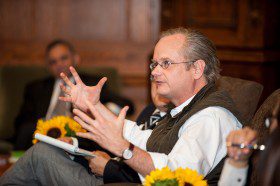
Lawrence Lessig
Lawrence Lessig, Roy L. Furman Professor of Law and Leadership, Harvard Law School, continued the conversation by complicating the distinction between the electoral and non-electoral aspects of democracy. The United States, Lessig argued, has allowed influences to evolve that have produced a deeply dysfunctional democracy at the federal level. This is evidenced by the exceptionally low favorability ratings of both Congress and the current presidential candidates. Today the masses are revolting against elites in American politics, which may explain the appeal of presidential candidates Donald Trump and Bernie Sanders. A major reason for this revolt is the “filter of money” in American politics. Candidates for Congress spend between 30-70 percent of their time raising money from a tiny elite fraction of Americans (around .02 percent). Republican candidates pander to these elites even when policies such as a renewed attack on social security are unpopular with voters. The problem, Lessig concluded, is constitutionally difficult but essential to solve. Varshney suggested a profound contrast between the United States and India in this respect. In India, upper castes believe that there has been a lower caste takeover of politics – and, at least at the state level, they are essentially correct. Corporate elites, while financing the election process, find themselves unable to determine election outcomes.
Sonali Samarasinghe, Editor-in-Chief, The Lanka Standard, began by recounting the century-old history of democracy in Sri Lanka. Milestones include the achievement of universal adult franchise in 1931 (long before India), and universal free education by 1945 (which explains why literacy rate overall is 92.5 percent). There were high aspirations for Sri Lankan democracy at the moment of independence, but subsequent insurgencies and civil wars had a devastating impact. However, as in India, the voting habit in Sri Lanka remains deeply ingrained. For example, former President Mahinda Rajapaksa was not allowed to cling onto power after his electoral defeat in 2015 due to the resilience of administrative structures (particularly the army and police). By and large, Sri Lanka has a history of free and fair elections, with several notable exceptions. In 2005, many Tamils were not allowed to vote by the militant LTTE, and southern minorities, including Christians, were also disenfranchised. This contributed to Rajapaksa’s narrow victory. Civil liberties have been curtailed during periods of violence, and the state has been brutal in suppressing uprisings. After the end of the civil war in 2009, democratic institutions became tools in the hands of the Rajapaksa regime and term limits were lifted. With the 2015 elections heralding a peaceful transition of power, Sri Lankans feel a sense of hope.
Aqil Shah, Wick Cary Assistant Professor of South Asian Politics in the College of International Studies at the University of Oklahoma, and Non-resident scholar at the Carnegie Endowment for International Peace, explained that Pakistan has cycled between unstable civilian governments and stable military rule. The good news for Pakistan is that a peaceful transition of power between elected governments occurred in 2013, with the outgoing Pakistan People’s Party (PPP) government completing its tenure. There is an evolving consensus in Pakistan today about rejecting military rule as a governing formula, which can be traced back to the success of the Lawyers’ Movement against the dictatorship of Gen. Pervez Musharraf in 2007. There are new centers of power to contest the military establishment, including the judiciary and a vibrant but fractious media. The bad news, Shah continued, is that Pakistan is evolving into a hybrid between democracy and authoritarianism due to military’s exercise of “co-optive” or soft power. There are “red lines” the media cannot cross. For example, military policies in tribal areas or Baluchistan cannot be questioned. The military also maintains control over foreign policy by mobilizing populist politicians like Imran Khan, as seen in the reaction to current Prime Minister Nawaz Sharif’s attempts to normalize relations to India. The military exerts control over internal security by maintaining and manipulating jihadist networks. The national security state, Shah concluded, has survived the democratic transition, with a key role played by continued aid from the United States. Here Ashutosh Varshney invoked Samuel Huntington’s principle of “two turnovers” as the foundation for electoral democracy. Pakistan has successfully completed one such electoral turnover, but the future remains uncertain.
The final speaker of the session, Salil Tripathi, Contributing Editor at Mint and Caravan, Chair, PEN International’s Writers in Prison Committee, and author of The Colonel Who Would Not Repent: The Bangladesh War and its Unquiet Legacy, described the “structures of democracy in Bangladesh,” derived mainly from the colonial period. The press, parliament and judiciary are “borrowed institutions” in Bangladesh today, to use V.S. Naipaul’s phrase, and they do not function as they should. There were no free and fair elections between independence in 1971 and 2008. The assassination of the country’s first leader, Sheikh Mujibur Rahman, was followed by a succession of military coups. Many Bangladeshis, Tripathi pointed out, view the caretaker government installed before the 2008 election as a “golden period” of relative stability. This election saw the return to power of the Awami League, led by Mujib’s daughter Sheikh Hasina, over the rival Bangladesh National Party (BNP). Hasina eliminated the caretaker government before the next election in 2013, resulting in a BNP boycott and continued political instability. Following Samuel Huntington’s principle, Bangladesh has only completed one “turnover” since 2008. Regarding the non-electoral aspects of democracy, Tripathi outlined four distinct challenges to freedom of the press: journalists being held in contempt of court (as seen the case of David Bergman, who has been critically reporting on the ongoing “International Crimes Tribunal”); sedition and libel cases brought against even such respected journalists as Mahfuz Anam, editor of The Daily Star; the enduring charge of “causing offense” to religious sentiments, which led to a book stall being recently shut down at the Ekushey Book Fair in Dhaka; and the “spectacular failure” of the state to protect free-thinking bloggers and writers from rising Islamist violence. Overall, Tripathi concluded, there are significant questions to be asked about the durability of democracy in Bangladesh.
Following the individual presentations, Varshney asked the panelists to evaluate the status of minorities in their respective cases. Lessig stated that there is no constitutional standard for evaluating equal demands for resources and access to the political process in the United States, leading to effective disenfranchisement – or what he termed a “poll tax on the poor.” Samarasinghe described the present Sri Lankan government’s attempts to engage minorities, in view of the drafting of a new constitution. From a symbolic point of view, the national anthem was recently sung in Tamil for the first time since 1948. Shah stated bluntly that “Pakistan is no country for minorities,” citing state-sponsored Sunni jihadi groups carrying out genocidal violence against Shias, and minorities such as Christians and Hindus bearing the brunt of blasphemy laws. Tripathi countered the perception that Hindus in Bangladesh are “under siege.” There is a high degree of respect for Bengali culture, which brings the country together, but other minorities (Chakmas in Chittagong Hill Tracts, Santhals) are indeed vulnerable. The most significant threats today are against atheists or free-thinkers and the LGBT community.
A lively and engaged Q&A ended the session. Panelists were asked about the relationship between political dynasties and democracy in South Asia, the viability of political institutions as they are “transferred” from the West to a different context, the role of women, and the prospects of freedom of information laws. It was clear that there is an extraordinary degree of variation within South Asia with regard to the democratic experience, a variation with deep historical roots. There have been important recent efforts in Sri Lanka, Pakistan, and Bangladesh to institutionalize the electoral process, while non-electoral freedoms seem to be under attack even in democratic India. These parallel developments are of interest not only to scholars and observers of South Asia, but also to the wider world.
Click here to view more photos from the event.
Check back on our site for full videos from the event.

